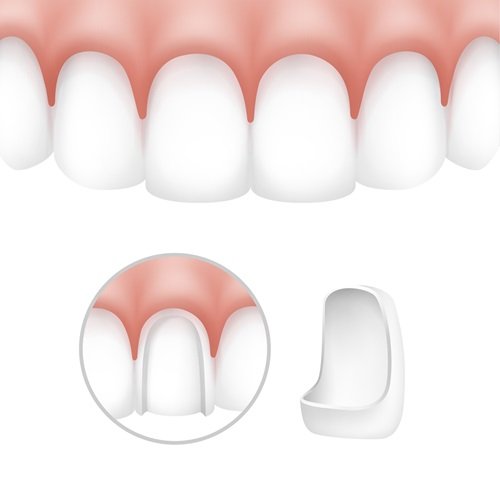Understanding Veneer Treatment
A dazzling smile is a powerful asset, boosting confidence and making a lasting impression. If you’re considering enhancing your smile with veneers, navigating the porcelain vs. composite debate can be tricky.
Porcelain Vs. Composite Veneers: Both offer distinct advantages and disadvantages, making the choice highly personal. This detailed guide from American Dental Practices, conveniently located in Oberoi Mall, Malad, Mumbai, and Indiranagar, Bangalore, sheds light on these popular veneer options, empowering you to make an informed decision.

Porcelain Veneers: Durability Matters
Porcelain veneers, crafted from thin shells of high-quality dental porcelain, are renowned for their unmatched aesthetics and longevity. Let’s delve deeper into their unique characteristics:
Pros:
- Unmatched Esthetics: Porcelain boasts a light-reflecting property that mimics natural tooth enamel, achieving a remarkably lifelike appearance. Dentists can customize the shade and translucency to seamlessly blend with surrounding teeth for a truly radiant smile.
- Superior Durability: Porcelain veneers are incredibly strong and chip-resistant, lasting an impressive 10-20 years with proper care. This translates to a long-lasting investment in your smile.
- Stain Resistance: Unlike natural teeth, porcelain is highly resistant to staining from coffee, wine, and other beverages. This makes it ideal for individuals who enjoy these indulgences without worrying about discoloration.
- One of the most conservative option in cosmetic dentistry as the amount of filing of teeth is usually 0.3 mm and in certain situations we might not even have to do any filing of teeth, those are called as ‘non prep veneers’.
Composite Veneers: Convenience at a Cost
Composite veneers, made from a tooth-colored resin material, offer a practical alternative to porcelain. Here’s a closer look at their key features:
Pros:
- Cost-Effective: Composite veneers are generally less expensive than porcelain veneers, making them a more budget-friendly option.
- Less Invasive Procedure: In most cases, minimal to no enamel removal is required when placing composite veneers. This minimally invasive approach preserves more of your natural tooth structure.
- Single Appointment Procedure: Composite veneers can often be sculpted and placed directly onto your teeth in a single visit, saving you valuable time.
- Reversible: Since minimal enamel removal is involved, composite veneers can sometimes be reversed if necessary.
Cons:
- Shorter Lifespan: Compared to porcelain, composite veneers typically last 5-7 years. They may require replacement sooner due to potential chipping, staining, or wear.
- Prone to Staining: The resin material in composite veneers is more susceptible to staining from certain foods and beverages. Maintaining a strict oral hygiene routine is essential to preserve their aesthetics.
- Potentially Less Natural Appearance: While skilled dentists can achieve excellent results, composite veneers may not always match the light-reflecting properties of natural teeth as flawlessly as porcelain.
Making the Perfect Choice: Porcelain vs. Composite Veneers
The ideal choice between porcelain vs. composite veneers hinges on your individual priorities and circumstances. Here are some key factors to consider:
- Budget: If cost is a primary concern, composite veneers might be a more suitable option.
- Desired Longevity: If long-lasting results are your top priority, porcelain veneers offer superior durability.
- Stain Resistance: For individuals who consume stain-causing foods and beverages regularly, porcelain’s stain resistance might be a significant advantage.
- Tooth Discoloration: If your teeth are severely discolored, porcelain veneers offer better coverage and can achieve a whiter shade.
- Time Constraints: If you prefer a single-visit procedure, composite veneers might be the more convenient option.
Making the Right Choice for Veneer Treatment in Mumbai & Bangalore
American Dental Practices recommends scheduling a consultation with an experienced dentist to discuss your unique smile goals and determine the best material for your veneers. Our dentists in Malad, Mumbai, and dentists in Indiranagar, Bangalore, will conduct a thorough examination, answer your questions, and guide you towards achieving the dazzling smile you deserve.
Schedule a consultation with American Dental Practices today!
Choosing between porcelain and composite veneers is an important decision. By understanding the unique characteristics, advantages, and disadvantages of each material, you can make an informed choice that aligns with your aesthetic goals, budget, and lifestyle. American Dental Practices is committed to providing exceptional dental care, including high-quality veneer treatments. Contact us today to schedule a consultation with our experienced dentists in Malad, Mumbai, or Indiranagar, Bangalore, and embark on your journey towards a radiant smile!
FAQ’s
Can I whiten my existing veneers?
Unfortunately, neither porcelain nor composite veneers can be whitened with traditional bleaching methods. However, your dentist may be able to replace your veneers with a lighter shade if desired.
Do veneers damage my teeth?
Porcelain veneers require the removal of a small amount of enamel, while composite veneers typically involve minimal to no enamel removal. While generally safe, any procedure involving the alteration of tooth structure carries some inherent risk. Discussing these risks with your dentist during the consultation is crucial.
How long does the veneer placement procedure take?
Porcelain veneers typically involve two appointments, each lasting around an hour. Composite veneers can often be completed in a single visit, depending on the complexity of the case.
What kind of aftercare is required for veneers?
Both porcelain and composite veneers require excellent oral hygiene practices, including brushing twice daily, flossing regularly, and attending routine dental cleanings. Additionally, avoiding habits like chewing on hard objects is essential to prevent chipping or damage.
Can I still eat and drink normally with veneers?
Yes, you can! However, it’s wise to avoid excessively hard, sticky, or chewy foods that could potentially damage the veneers.
Porcelain Vs. Composite Veneers, What will you go for?






